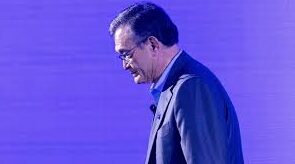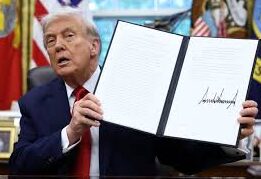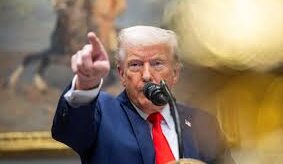US President Donald Trump has called on Intel’s chief executive to “step down immediately,” accusing him of damaging relations with China.
In a social media post, Trump claimed that CEO Lip-Bu Tan had been “highly conflicted,” apparently referring to reports about his investments in firms allegedly linked to the Chinese military. It’s unusual for a US president to directly demand the resignation of a corporate leader.
Tan took the helm of the American chip giant in March, tasked with turning around a company that once led the semiconductor industry but has recently fallen behind its rivals. Intel has secured billions of dollars in US government funding as part of Washington’s effort to rebuild domestic chip manufacturing.
In a statement on Thursday, Intel insisted it was making major investments in the US “in line with President Trump’s America First agenda” and remained committed to advancing both “America’s national and economic security interests.”
Born in Malaysia and raised in Singapore, Tan is a naturalized US citizen and a veteran venture capitalist with deep experience in semiconductors. In a recent update to investors, he announced plans to scale back manufacturing spending—including in the US—to match market demand. Intel has already cut thousands of jobs this year as part of a company-wide restructuring.
Following Trump’s remarks, Intel shares fell more than 3% by midday. Trump has previously criticized the company and is preparing to raise tariffs on the chip industry.
“The CEO of Intel is highly conflicted and should resign immediately. There is no other solution,” Trump posted.
Although it’s not illegal for Americans to invest in Chinese firms, Washington has been tightening restrictions since Trump’s first term, aiming to decouple from China in advanced technologies—an effort supported by both Republicans and Democrats.
Trump’s comments came after Republican Senator Tom Cotton sent a letter to Intel’s board raising concerns about Tan’s “associations” and questioning whether he could responsibly manage taxpayer-funded resources. Cotton pointed to Tan’s long tenure as CEO of Cadence Design Systems, which in July admitted to violating US export controls through its China subsidiary and agreed to pay $140 million in penalties. Tan himself was not charged.
Intel has defended its relatively new CEO, stating earlier this week that both Tan and the company were committed to protecting “US national security and the integrity of our role in the American defense ecosystem.”
Industry analyst Patrick Moorhead suggested Trump may be using the controversy over Tan’s China ties as leverage against Intel, particularly amid reports of potential collaborations with Taiwan’s TSMC—a White House-backed rival. “It’s clear to me that there was some interaction between them that Trump didn’t like,” Moorhead said. “He probably thought, ‘Here’s my chance to turn up the heat on Intel.’”
Trump has a history of publicly targeting business leaders in a way few other presidents have. Still, demanding the resignation of a private company’s CEO is extraordinary, even for him. Moorhead noted that other tech executives who clashed with Trump often found ways to “kiss the ring” by announcing large US investments—something Intel may have underestimated in its dealings with the administration.
Responding to criticism that Trump’s move was excessive, the White House told the BBC: “President Trump is fully committed to protecting our national and economic security. That includes ensuring that world-class American companies in critical sectors are led by men and women the American people can trust.”
Tan’s links to China were highlighted in a 2024 congressional report examining US investment ties to Chinese businesses. An April Reuters investigation found he had invested—either personally or through his funds—at least $200 million in hundreds of Chinese companies between 2012 and December 2024, some of which were tied to the Chinese military.
On Thursday, Republican Senator Bernie Moreno, a Trump ally, also criticized Tan, blaming Intel for delays in its US chip manufacturing projects.
However, a direct clash with Donald Trump could further intensify the challenges facing not only the company but the entire U.S. semiconductor manufacturing sector.
Janet Egan, Senior Fellow at the Center for a New American Security, emphasized, “Intel has long been viewed as a critical hope for expanding America’s domestic chip production capacity, yet it has consistently struggled to deliver on that promise so far. It is absolutely essential that we ensure stable, consistent leadership to drive this strategic capacity growth and strengthen U.S. semiconductor independence.”






